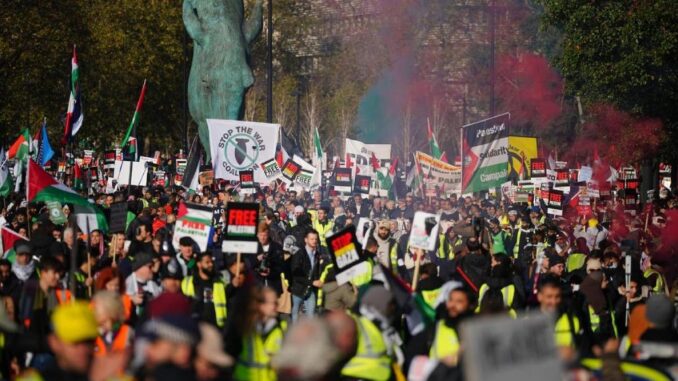
A state in decline, a rotten Labor Party, and a complicit union bureaucracy.
By Roni Turus – ISL UK
The Home Secretary, Suella Braverman, urged the police to criminalise individuals chanting ‘Free Palestine’ or waving a Palestinian flag. The Home Secretary and Prime Minister called police to ban the march which was organised to take place on 11th November. This was logistically impossible for the police to bar or caution everyone attending the demo.
This week, the Home Secretary went further, accusing the police of being more tolerant toward left-wing demonstrators than their right-wing and nationalist counterparts. This statement was made just days before the largest pro-Palestinian demonstration was scheduled.
The decay of a state typically begins with the erosion of civil liberties and accountability, treating protests as extremist threats to public safety. Intense pressure was exerted on the police to ban the pro-Palestinian demonstration scheduled for November 11th, citing a clash with Armistice Day. Prime Minister Rishi Sunak deemed the demonstration ‘provocative and disrespectful’, while the Home Secretary labelled it a ‘hate marches.’
Despite efforts to ban it, the determination of the protestors made it nearly impossible for the police to prevent the demonstration. Tens of thousands would have taken to the streets in London, challenging the ban and engaging in a cat-and-mouse game with the police. Contrary to media propaganda predicting violence, vandalism of monuments, and alleged connections to Hamas supporters, the demonstration concluded peacefully. However, following the Home Secretary’s statement, some fascists clashed with the police in London. This signals tacit approval from the British state for attacks on demonstrators, left-wing activists, human rights organisations, and particularly pro-Palestinian marchers.
The Labour Party has suspended any dissent not aligned with Israel’s policies since the internal coup that ousted Jeremy Corbyn. Its three primary missions now are expelling alternative voices, full submission to a market-capitalist economy, and unequivocal support for Zionist Israel.
Labour MP Andy McDonald, in a speech on October 28th, called for justice and peaceful coexistence between Israelis and Palestinians. The Labour MP Andy McDonald made a speech on 28 October he said: “We will not rest until we have justice. Until all people, Israelis and Palestinians, between the river and sea, can live in peaceful liberty.” He was promptly suspended from the Labour Party. Any Labour frontbenchers advocating for a ‘ceasefire’ face immediate suspension.
Labour leader Keir Starmer joined Western leaders in labelling the October 7th attacks as ‘terrorism.’ However, amid weeks of Israeli bombardment in Gaza resulting in over 11,000 Palestinian casualties, the Labour leader refrains from terming it ‘genocide’ and sticks to the official line that ‘Israel has the right to defend itself.’
For those holding out hope for the Labour Party’s progressive potential, it’s time to reconsider and seek a new political home. Remaining in the Labour Party comes at the cost of silence, as it continues to align itself with capitalist, imperialist, and bourgeois interests. While there may be some progressive and socialist individuals within the Labour Party, it will not be a force for transformative change.
The abhorrent stance against Palestinians extends beyond the Labour Party to the trade union movement. The Trades Union Congress (TUC) has not endorsed a boycott of Israeli products or arms shipments to Israel.
Contrastingly, Belgian trade unions set an example by calling for an immediate ceasefire and halting the handling of flights carrying military material to Israel. Activists in Canada, Italy, Australia, the USA, Spain, and Chile have taken grassroots actions to protest arms sales to Israel.
However, the TUC passed a resolution urging the British government to increase arms production, allocating 3% of GDP to this purpose. The resolution points to the Ukrainian war as a justification for the need for more weapons.
Despite these challenges, there are signs of hope. One million people in London demonstrated for an immediate ceasefire.
In Bristol, hundreds of school pupils participated in a ‘School Strike for Palestine,’ expressing solidarity with Palestinian children affected by the conflict.
On November 7th, students boycotted an assembly with Labour MP Wes Streeting over his party’s stance on Israel-Palestine. Trade union members in Kent, England, blocked the entrance to a BAE Systems factory manufacturing weapons for Israel, urging a cessation of arms sales. Fifty Labour Party councillors have resigned, and 330 are pressing Keir Starmer to call for an immediate ceasefire, with some even calling for his resignation.
The trade union presence was strong in the Palestinian solidarity demonstration on November 11th, with a dedicated Trade Union block for organised workers, showcasing their visibility and diverse banners. Amid these events, there is a growing realisation among workers, progressives, socialists, and the younger generation that they have been politically homeless for too long in England. These forces are finding opportunities to come together and engage in dialogue for the first time since the defeat of the trade union movement in the 1980s. Whether this coalesces into a class-based political force remains to be seen.








